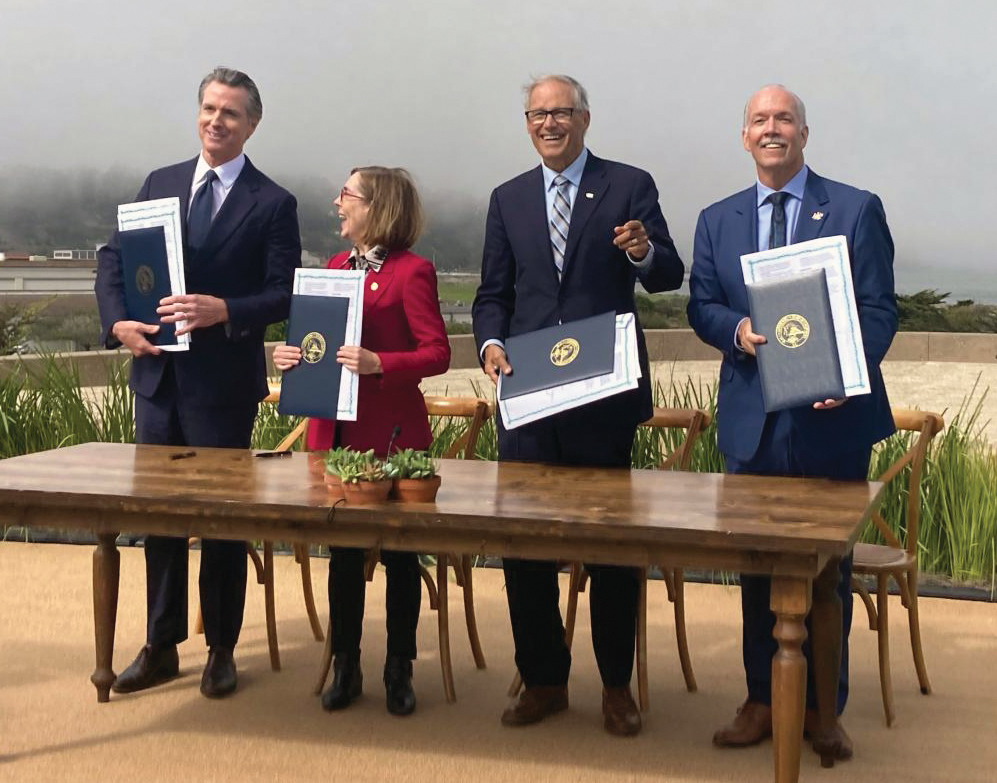
The governors of three U.S. Pacific Coast states and British Columbia’s premier gathered in San Francisco recently to sign an agreement that looks like it could result in additional environmental initiatives being launched across the West Coast’s maritime industry.
The initiatives could include offshore wind power, something that’s been controversial and not popular so far within the commercial fishing industry.
California Gov. Gavin Newsom, Oregon Gov. Kate Brown, Washington Gov. Jay Inslee and British Columbia Premier John Horgan signed the Pacific Coast Collaborative Statement of Cooperation on Oct. 6.
The Statement of Cooperation (SOC) promotes collaboration between the four regional governments on accelerating the transition to a low-carbon economy, investing in climate infrastructure like electric vehicle charging stations and a clean electric grid, and protecting communities from climate impacts like drought, wildfire, heat waves and sea-level changes.
“By signing this statement of cooperation, we’re building on our strengths as leaders in climate action and positioning ourselves for success in a clean energy economy,” Horgan said. “Working together, we’re charting a path to a cleaner, stronger future with good jobs and opportunities – for people on both sides of the border.”
Among the commitments in the agreement are the launch of a regional dialogue with ports and other levels of government, where appropriate, about how to achieve collective decarbonization goals through strategies such as electrifying drayage and cargo-handling equipment; investing in infrastructure for shore power that helps reduce emissions from ships, and pursuing strategies to advance low- and zero-carbon shipping, including increased communication and coordination with shippers to advance green shipping and the supply chain.
The agreement also includes commitments to support “an equitable and just transition to a low carbon and climate resilient future,” as well as investing in climate infrastructure, such as electric vehicle charging stations, green ports and a “clean and reliable” electric grid.
“We share ambitious goals for reducing greenhouse gas emissions at least 80% by 2050,” the collaborative members said in a statement.
“This new agreement reaffirms our commitments to decarbonize our economies at a time when the consequences of victory or defeat in this effort have never been more acute,” Inslee said. “Our partnerships speak to just how diverse and interconnected the green energy economy has already become.”
“We know where it goes from here—onward to a cleaner, cheaper, and more efficient energy economy,” he continued. “Together we will invest in an equitable transition to a cleaner future (and) build the climate infrastructure we need.”
The Pacific Coast of North America represents a region of 57 million people with a combined gross domestic product of $3.5 trillion, according to coalition data.
“The West Coast is united as we lead the way towards a clean energy future that helps our entire region and economies to thrive,” Brown said. “In Oregon, we have set ambitious goals to reach 100% clean energy sources, reduce carbon emissions and comprehensively address climate change.”
According to Washington state data, the clean energy and clean technology sectors continue to expand in the U.S., outpacing fossil energy jobs. Washington’s clean energy sector reflects that growth, with nearly 77,000 jobs currently in the industry.
And if the agreement between the three states and province reaches its goals, then seaports up and down the West Coast could see a sizable number of electrification and clean energy projects—such as solar and wind energy development, as well as shoreside power at seaports—developed and launched in the coming months and years.
Managing Editor Mark Nero can be reached at mark@maritimepublishing.com
